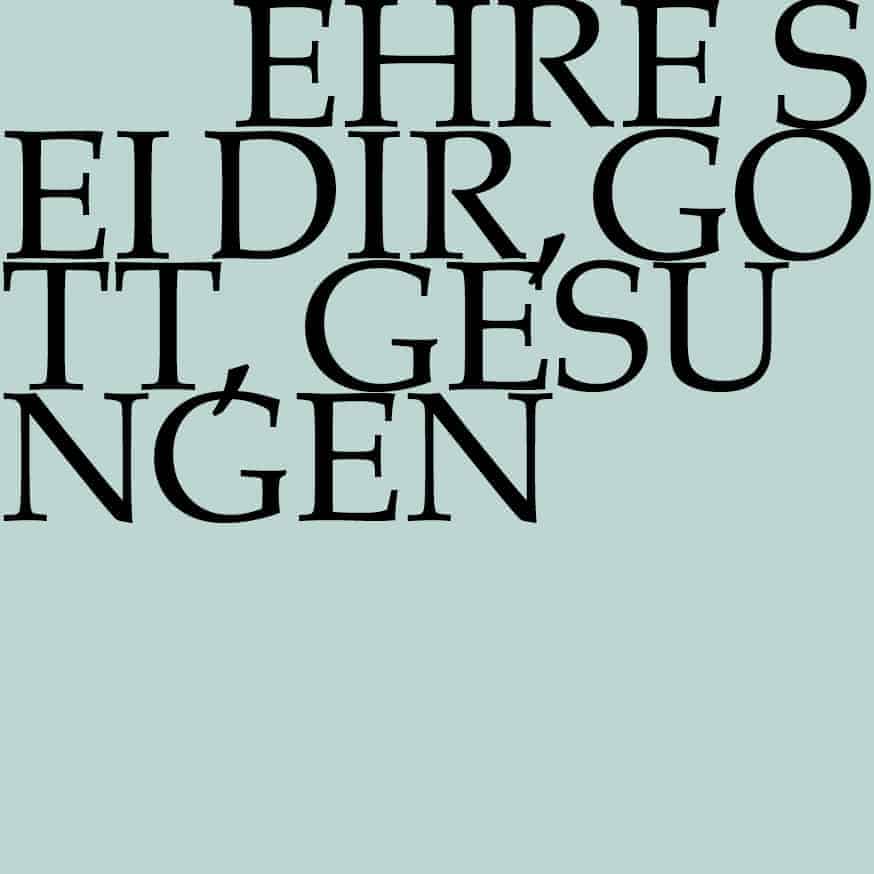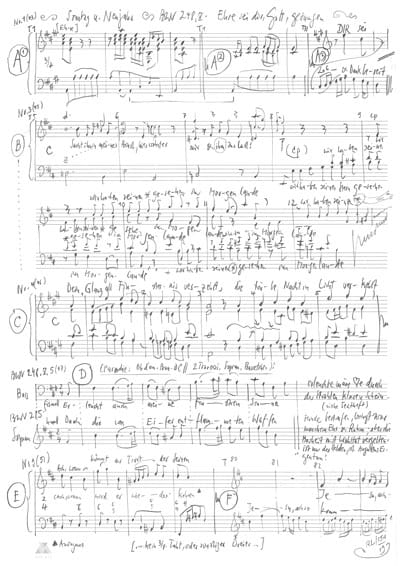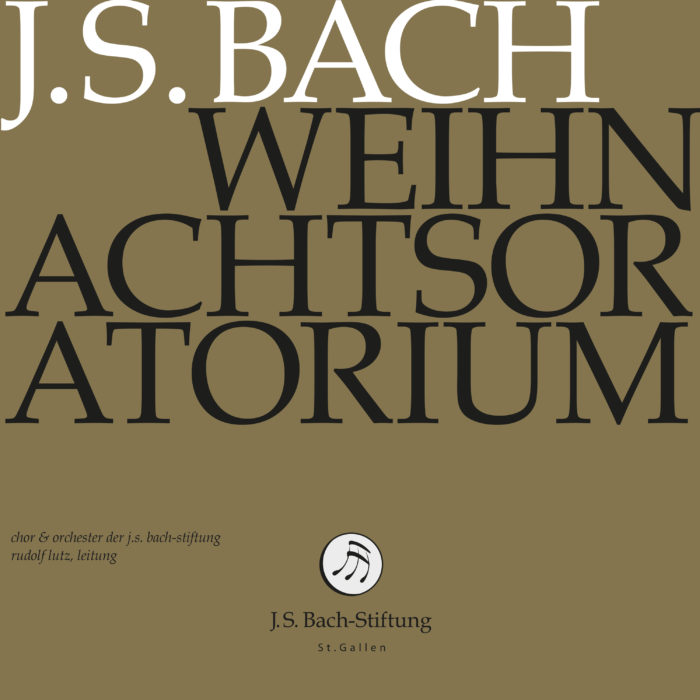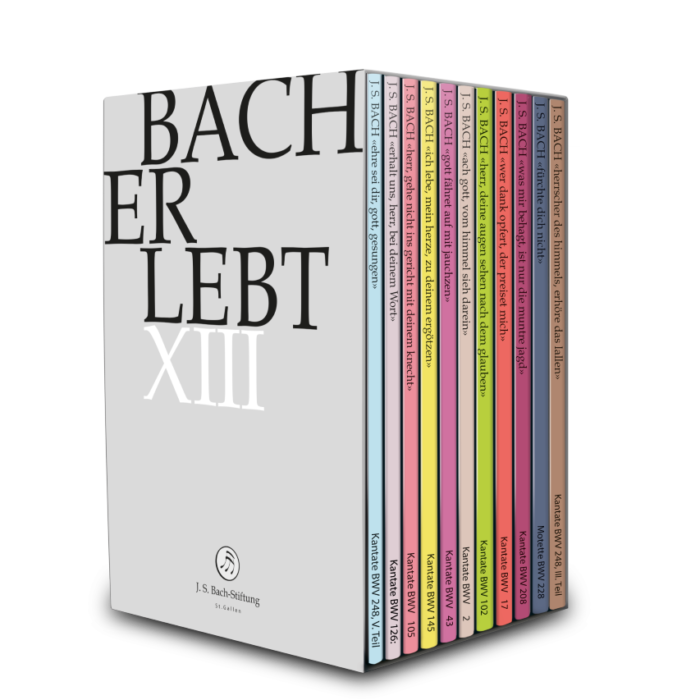Ehre sei dir, Gott, gesungen
BWV 248/5 // Christmas Oratorio
(Glory to thee, God, be sounded) for soprano, alto, tenor and bass, vocal ensemble, oboe d’amore I+II, strings and basso continuo

Would you like to enjoy our videos ad-free? Subscribe to YouTube Premium now...
Workshop
Reflective lecture
Soloists
Soprano
Marie Luise Werneburg
Alto
Margot Oitzinger
Tenor
Daniel Johannsen
Bass
Matthias Helm
Choir
Soprano
Jessica Jans, Simone Schwark, Susanne Seitter, Noëmi Tran-Rediger, Alexa Vogel, Anna Walker
Alto
Antonia Frey Sutter, Lara Morger, Lea Pfister-Scherer, Alexandra Rawohl, Simon Savoy
Tenor
Marcel Fässler, Clemens Flämig, Tiago Oliveira, Sören Richter
Bass
Fabrice Hayoz, Grégoire May, Simón Millán, Philippe Rayot, Jonathan Sells
Orchestra
Conductor
Rudolf Lutz
Violin
Eva Borhi, Lenka Torgersen, Peter Barczi, Christine Baumann, Dorothee Mühleisen, Ildikó Sajgó
Viola
Martina Bischof, Matthias Jäggi, Sarah Mühlethaler
Violoncello
Maya Amrein, Hristo Kouzmanov
Violone
Markus Bernhard
Oboe d‘amore
Andreas Helm, Philipp Wagner
Bassoon
Susann Landert
Harpsichord
Thomas Leininger
Organ
Nicola Cumer
Musical director & conductor
Rudolf Lutz
Workshop
Participants
Rudolf Lutz, Pfr. Niklaus Peter
Reflective lecture
Speaker
Rudolf Wehrli
Recording & editing
Recording date
18/01/2019
Recording location
Trogen AR (Schweiz) // Evangelische Kirche
Sound engineer
Stefan Ritzenthaler, Nikolaus Matthes
Director
Meinrad Keel
Production manager
Johannes Widmer
Production
GALLUS MEDIA AG, Switzerland
Producer
J.S. Bach Foundation of St. Gallen, Switzerland
Librettist
First performance
1 January 1735 in Leipzig
Text
Christian Friedrich Henrici (Picander)
Georg Weissel (46.); Johann Franck (53.)
Libretto
43. Chor
Ehre sei dir, Gott, gesungen,
dir sei Lob und Dank bereit’.
Dich erhebet alle Welt,
weil dir unser Wohl gefällt,
weil anheut
unser aller Wunsch gelungen,
weil uns dein Segen so herrlich erfreut.
44. Rezitativ (Evangelist: Tenor)
»Da Jesus geboren war zu Bethlehem im jüdischen Lande zur Zeit des Königes Herodis, siehe, da kamen die Weisen vom Morgenlande gen Jerusalem und sprachen:«
45. Chor und Rezitativ — Alt
»Wo ist der neugeborne König der Jüden?«
Sucht ihn in meiner Brust,
hier wohnt er, mir und ihm zur Lust!
»Wir haben seinen Stern gesehen im Morgenlande und
sind kommen, ihn anzubeten.«
Wohl euch, die ihr dies Licht gesehen,
es ist zu eurem Heil geschehen!
Mein Heiland, du, du bist das Licht,
das auch den Heiden scheinen sollen,
und sie, sie kennen dich noch nicht,
als sie dich schon verehren wollen.
Wie hell, wie klar muß nicht dein Schein,
geliebter Jesu, sein!
46. Choral
Dein Glanz all Finsternis verzehrt,
die trübe Nacht in Licht verkehrt.
Leit uns auf deinen Wegen,
daß dein Gesicht
und herrlichs Licht
wir ewig schauen mögen!
47. Arie — Bass
Erleucht auch meine finstre Sinnen,
erleuchte mein Herze
durch der Strahlen klaren Schein!
Dein Wort soll mir die hellste Kerze
in allen meinen Werken sein;
dies lässet die Seele nichts Böses beginnen.
48. Rezitativ (Evangelist: Tenor)
»Da das der König Herodes hörte, erschrak er und mit ihm das ganze Jerusalem.«
49. Rezitativ — Alt
Warum wollt ihr erschrecken?
Kann meines Jesu Gegenwart
euch solche Furcht erwecken?
O! solltet ihr euch nicht
vielmehr darüber freuen,
weil er dadurch verspricht,
der Menschen Wohlfahrt zu verneuen.
50. Rezitativ (Evangelist: Tenor)
»Und ließ versammlen alle Hohepriester und Schriftgelehrten unter dem Volk und erforschete von
ihnen, wo Christus sollte geboren werden. Und sie sagten ihm: Zu Bethlehem im jüdischen Lande; denn also stehet geschrieben durch den Propheten: Und du Bethlehem im jüdischen Lande, bist mitnichten die kleinest unter den Fürsten Juda; denn aus dir soll mir kommen der Herzog, der über mein Volk Israel ein Herr sei.«
51. Arie Terzett — Sopran, Alt, Tenor
Ach, wenn wird die Zeit erscheinen?
Ach, wenn kömmt der Trost der Seinen?
Schweigt, er ist schon würklich hier!
Jesu, ach so komm zu mir!
52. Rezitativ — Alt
Mein Liebster herrschet schon.
Ein Herz, das seine Herrschaft liebet
und sich ihm ganz zu eigen gibet,
ist meines Jesu Thron.
53. Choral
Zwar ist solche Herzensstube
wohl kein schöner Fürstensaal,
sondern eine finstre Grube;
doch, sobald dein Gnadenstrahl
in denselben nur wird blinken,
wird es voller Sonnen dünken.
Dr. Rudolf Wehrli
Christmas is almost a month behind us, as is the winter solstice, which as the original festival of the “Sol invictus”, the unconquered sun god, set the date in the 4th century for the young Christianity. Since then, the days have become longer, darkness recedes a little further each day, and light fills the days in its place in our latitudes.
Light and darkness, however, are of a different quality in our cantata: the metaphor of light is, as it were, the leitmotif: in an ancient tradition of religious history, probably originally from the Near East, perhaps also from ancient Egypt, the radiance of light consumes all the darkness of night and accompanies the overcoming of deception and error through truth and salvation. This tradition is also found centuries later in the Greco-Roman cultural sphere, in the early Greek epic poet Hesiod as well as in the pre-Socratic Parmenides at the beginning of the 5th century BC, who sets out from the house of night on a journey across the whole earth to find the pure truth in the radiant light of the sun.
Even more astonishing is the 4th eclogue to the “Birth of the Child” written by Vergil two generations before the Gospel of Matthew around 40 AD at the height of a Roman civil war, in which he took up the old oriental myth “The Prophecy of the Sibyl” – as he says: “That boy,” it says, “will receive the life of the gods, will consort in heaven with the blessed and the heroes, and will become a ruler of peace over the world by the power of the Father.” The parallels with the texts of the evangelists Matthew and Luke are also striking in the further course of the text, right down to the overwhelming radiance of a heavenly light, the reference to the sun god and the god of the turn of time or “the fulfilment of time”, a phrase used by Paul in Galatians just as by Mark at the beginning of his Gospel.
The birth of a divine boy, supernatural light, the promise of a new time, the dawn of eternal peace, these are the images of the most intense human hope in dark times, times of war, terrible events and suffering that is hard to bear. The metaphor of light thus extends to a second level: the light is to illuminate the dark senses of man, so that – according to our text – the soul does not begin anything evil. And immediately in the recitative that follows, an evil foreboding appears: for Herod was frightened and with him the whole of Jerusalem – at least that of the established, the high priests and scribes.
Thus the religious metaphor of light and darkness, of truth and deception, develops a peculiar dialectic: peace, promise, light, the birth of the divine child at the turn of time, and right next to it the darkness, the doom into which Herod’s terror leads in the narrative strand of Matthew’s Gospel: the terror of the Bethlehemite infanticide.
Why this? So we ask ourselves. Well, Herod was terrified that there was a newborn king of the Jews whom he could only understand as a rival who challenged his power. The aforementioned dialectic, of course, now opens an abyss: the newborn king, bearer of the promise, of salvation, who is supposed to bring peace, triggers fear and thus aggression, becomes the instigator of discord. A religious hope has unintended consequences because it questions existing conditions, the politically established: The grand ideal mutates into inconceivable horror when confronted with reality!
In Goethe’s “Faust”, Mephisto introduces himself at the beginning (quote) “al sein Teil jener Kraft, die stets das Böse will und stets das Gute schafft”. In a frightening reversal of this verse, the force that always wants good and thereby provokes evil, the infanticide in Bethlehem, would now appear in our text. Could it be that religious hope, high ideals of faith, in reality also bring about evil, that the inner power of peacemaking promises can also turn into outbreaks of violence? Could it be that the power that always wants to create good, peace, becomes the cause of discord, suffering and death?
The paradox is difficult to understand, even more difficult to accept, and that is probably why Matthew places the events in the fulfilment of the history of God’s people, with the so-called reflection quotations such as, for example, “damit erfüllt werde, was geschrieben stand”.
Nevertheless, the contradiction of peace and strife, the dialectic of promise and violence, remains a scandal, a thorough and irritating nuisance. And it is one of the sad paradoxes of Western history that in the name of the religion that promises peace, again and again people have been oppressed, humiliated, murdered or entire regions have been covered with wars. There are many examples: the Christianisation of the Saxons under Charlemagne, the Crusades, the terrible disputes over the right faith in the Thirty Years’ War or the executions of individuals who disputed certain tenets of the established churches.
Certainly, such conflicts were and still are by no means solely about religious convictions, but almost always also about economic, political, social and cultural conditions or oppression; however, the inner energy of a religious belief is all too often instrumentalised, and in this respect political and religious orientation systems then often reinforce each other.
Indeed, the inner power of peacemaking promises, the fervent belief in noble ideals can also end in violence. The awareness of this can become a late reflex of the Enlightenment: Where it becomes conscious that both peace and strife are inherent in the inner power of religion, where it becomes conscious that convinced religious faith can also turn into violence, the conversion of a faith that lives on the promise of peace into violent intolerance is perhaps less successful.
However: It is not only the abysmal dialectic that creates distance and alienates the text in its traditional context: it is also the difficulties we have today with the personal image of God present throughout the text. And just as distant for most people today is Luther’s question, which is present everywhere in the text: “How do I reach a God who is gracious to me?” Man walking in darkness, at the mercy of sin and therefore in need of divine grace, which as salvation can only come from above, all this is not the attitude to life in times of globalisation and digitalisation – just as little as the salvation-historical drama of death and resurrection still reaches a majority.
But we would not know what has taken the place of this closed Christian worldview, what values and firm convictions guide people today. For the dissolution of traditional Christian contexts of meaning in the wake of the Enlightenment and secularisation has left people without orientation as “orientation orphans”, as Hermann Lübbe called them. And no one knows where orientation could come from.
Nowhere is this clearer than in the sciences: Although we are achieving more and more in many disciplines – in medicine, for example, with the prolongation of life, in business administration with permanent increases in productivity – we know more and more about how and at the same time less and less about what for. It seems to me that it would be urgently necessary, in addition to perfecting knowledge and action in the individual sciences, to increasingly consider the meaning of all this activity.
This brings us back to the opening chorale of our cantata: “Ehre sei dir, Gott gesungen”, which puts us right in the centre of Bach’s creative work and his overwhelming music-making: “Soli Deo Gloria” (Glory to God alone) was the title of many of his compositions, because he saw his work in a larger context of meaning created by God, because the meaning of his actions was evident to him – and he probably also understood his harmonies as an outflow of divine meaning.
However, those who, as children of a secularised modern age – as orphans of orientation – have lost faith in such contexts of meaning, are left with questions. Among them is the question of whether there is a post-Christian interpretation of the texts from the Bible and hymnal. For whatever happens does not appear to him as part or result of a divine plan, not as the fulfilment of a higher purpose, but as mere contingency, as incoherent, random events. The idea that there is a divine plan behind everything is just as alien to him as the idea that this could even be understood – at most he may hope for a fate that is merciful to him. But perhaps our opening hymn “Ehre sei dir, Gott gesungen” can lead us to the humble realisation that such contingency – in God’s name – is not at the disposal of us humans. And thus such a post-Christian interpretation also becomes – to speak with Herder – a contribution to the promotion of humanity and brings light into the darkness of the world.
This text has been translated with DeepL (www.deepl.com).





